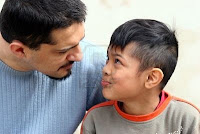Moms and dads go through a range of emotions when given their youngster’s diagnosis of Aspergers or High-Functioning Autism (HFA). Often times, brothers and sisters, grandmothers and grandfathers, and other family members go through a variety of emotions and stages of dealing with an Aspergers family member as well.
Professionals agree that the Aspergers or HFA youngster should be given information about his diagnosis, as well as support for understanding and coping with the new information. However, many moms and dads may fear a number of things if they tell their affected child – or other kids (and sometimes other family members) about their youngster’s disorder. For example, they may fear that:
Professionals agree that the Aspergers or HFA youngster should be given information about his diagnosis, as well as support for understanding and coping with the new information. However, many moms and dads may fear a number of things if they tell their affected child – or other kids (and sometimes other family members) about their youngster’s disorder. For example, they may fear that:
- the youngster (or others) will use the disorder as an excuse for why she can’t do something
- the youngster will think of himself (or others will think of the youngster) as a complete failure with no hope for a positive future
- their youngster may lose some of her options in life
- their youngster will become angry or depressed because he has a disorder
- their youngster will not understand
These issues may or may not occur, but can be dealt with if needed. Some of these issues may surface whether or not the youngster and others are told of the diagnosis. In any event, all involved – including the Aspergers or HFA child – should have important information about the disorder since the diagnosis will affect various aspects of his life.
The possibility of unwanted issues occurring is more likely when the child – and other family members – are not told about the disorder and given the support they need. Consider the stories told by many people on the autism spectrum who were not told – or not diagnosed – until they were grown-ups. Misunderstanding others and having poor social skills leads to poor interactions with others and results in ridicule and isolation. Being told, “You should know better than that” or “stop being so rude to people” – and not having a clue what they did or how to “fix” or change the situation – all lead to disappointment and bewilderment.
Many people who didn’t know they had the disorder until they were adults (either because their parents didn’t know, or withheld information) have self-disclosed that, as children, they were seen as a major disappointment and failure to their families and others, but had no clue why they failed or how to do better. Over time, the end result was low self-esteem and isolation. Many of these adults now feel that if they had received the correct information about their diagnosis and what their differences were as children, they would have had a better chance of being more successful in multiple areas today.
Your youngster may know that he’s different, but he may come to the wrong conclusions about his perceived differences if you, the parent, leave him in the dark about his diagnosis. He may even wonder if he has a terminal illness and is going to die. He sees doctors and therapists and goes for treatments – but is not told why. Even the youngster who doesn’t ask or verbally express concern about being different may still be thinking some of these thoughts. Even kids with Aspergers and HFA can sense the frustration and confusion of others, and as a result, they may come to the wrong conclusions about the cause of the turmoil around them.
It is the parents’ decision whether they share information about the diagnosis with their youngster. It can seem like an overwhelming task, especially when day-to-day issues consume all the time and energy of a family. It may be helpful to discuss your concerns and possible options for disclosure with others that know your youngster well, other moms and dads of kids on the spectrum, and even people with Aspergers and High-Functioning Autism who have been told about their diagnosis.
There is no exact age or time that is correct to tell a youngster about her diagnosis. Her personality, abilities and social awareness are all factors to consider in determining when she is ready for information about her diagnosis. Starting too early can cause confusion. If older when told, she may be extremely sensitive to any suggestion that she is different. You can look for the presence of certain signs that a youngster is ready for information. Some kids will actually ask, “Is there something wrong with me?” or “Why can’t I be like my friends?” These types of questions are a clear indication that your child needs some information about her diagnosis. Some Aspergers kids may have similar thoughts, but may not be able to express them.
Some kids don’t get a diagnosis until they are in adolescence. Frequently, those who are diagnosed later have had some bad experiences that can influence the decision of when to share information with them about their diagnosis. They may not be emotionally ready to cope with the new information because of the toll the bad experiences have taken on their sense of self-worth. They may be very sensitive to any information that suggests that they are “weird.” Thus, they are not ready for any diagnostic information. On the other hand, an older teen may already know about a previous diagnosis (e.g., Attention Deficit Disorder, Oppositional Defiant Disorder, etc.). Because of this history with another label, it may be an appropriate time to share the diagnosis and some concrete information about ASD.
Many parents have found that setting a positive tone about the child’s “uniqueness” is a great place to start. Everyone is unique with their own likes and dislikes, strengths and weaknesses, and physical characteristics. One of my favorite lines is, “God made us all different because he knew it would be too boring if we were all the same.” Differences can be discussed in a ‘matter of fact’ manner as soon as the youngster understands simple concrete examples of differences. With this approach, it is more likely that differences – whatever they are – can be a neutral or even fun concept. Matter of fact statements like, “Daddy has glasses and mommy doesn’t” or “Michael likes to ride his bike and you like to play computer games” are examples. The ongoing use of positive concrete examples of differences among familiar people can make it easier to talk to your son or daughter about other contrasts related to his/her diagnosis.
Many adults of the spectrum assert the view that kids should be given some information before they hear it from someone else or overhear or see information that they sense is about them. An Aspergers youngster may have the view that people don’t like him or that he is always in trouble, but doesn’t know why. If given a choice, waiting until a negative experience occurs to share the information is probably not a good idea.
It is important that the process of explaining the disorder to a youngster is individualized and meaningful. It can be hard to decide what and how much information to begin with. If your son or daughter has asked questions, this gives you a place to start. But make sure you understand what he/she is asking. Recall that it is easy to misinterpret the meaning of his/her words. For those kids who have a keen interest in their diagnosis (and whose reading ability is good), there are many books written by autistic kids that may be of interest. There are also many more books written by adults on the spectrum. These authors are reaching out to others with a diagnosis by sharing experiences, tips on life’s lessons, and helping readers feel that they are not alone in this journey.
To make your discussion meaningful, you can begin by talking about any questions that your child has asked. You may want to write down key points and tell her that others with this diagnosis also have some of the same questions and experiences. Then you could ask if she would like to find more information by reading books, watching videos, or by talking with other people. If asking your youngster if she wants information is likely to get a “no” response, you may choose to not ask, but tell her that you will be looking for information and would like to share it with her. Let her know that she can ask any questions she wants to – at any time.
When people with Aspergers and High-Functioning Autism have an opportunity to meet others with the diagnosis, they often find it is an eye-opening and rewarding experience. People with the disorder can sometimes better understand themselves - and the world - by interacting with others on the spectrum. Interacting with others on the spectrum can help your child realize that there are others that experience the world the same way he does, and that he is not the only one who is “different” (which makes the disorder not so different after all).
For many parents, using a therapist to begin the disclosure process may be helpful. Having a therapist involved, at least in the beginning stages of disclosure, leaves the role of support and comfort to the parents and those closest to the Aspergers or HFA youngster. For a child with the disorder, it can be especially hard to seek comfort from someone who gives you news that can be troubling and confusing. Having a therapist whose role is to discuss information about the youngster’s diagnosis and how the disorder is affecting his life can make it easier for parents to be seen by the youngster as supportive. The therapist discussing information with the youngster about his disorder can also help moms and dads to understand the youngster’s reaction and provide suggestions for supporting him. Having a therapist involved also allows the use of a location outside of the family home for beginning this process.
Explaining ASD to a child can’t be done in one or two conversations. The child needs time to assimilate the new information about herself at her own pace. It will likely take several weeks before the youngster initiates comments or asks questions about the new information. The process of explaining the disorder is ongoing. Making the information meaningful from the youngster’s point of view will greatly augment the learning process. Also, a positive “spin” on the condition helps maintain self-esteem and a productive atmosphere for learning.
More resources for parents of children and teens with Asperger's and High-Functioning Autism:


.jpg)


